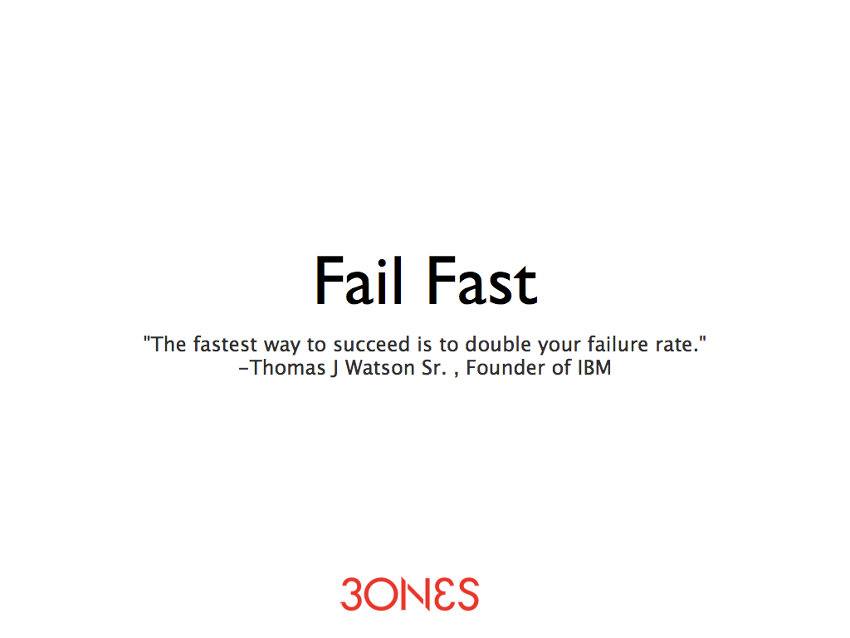Personal Development
The Biggest Secret to Webpreneurship Success: Fail Fast (and Learn from it!)
5th January 2015Do you know what the biggest secret to webpreneurship success is? Fail fast. What is fail fast, why should you fail fast and how to fail fast? Read on.
There are plenty of “secrets” in webpreneurship – ranging from SEO and link building strategies to various productivity/process automation tools. But did you know the biggest secret of all? Fail fast – with the healthy dose of resilience.
What is ‘fail fast’?
Fail fast is probably the best web asset building strategy so far. It is easy to say but challenging to do.
Fail fast means “bail out” (e.g. sell your web properties) when you know that your new sites won’t make it far, in such a way that you minimize losses and allow yourself to move on quickly, thus increasing your chances to strike gold.
How to know whether your websites suck or not? Well, let me put it this way; when building a site, you surely envision what the site should become in, say, a year time. When the site is already 1 year old and it’s not even close to what you envision the site to be, then it’s safe to say that this particular web property is failing.
Failing web properties may include these reasons: Lack of traffic, wrong niche choices, lack of money making potential, and many other reasons.
Why should I fail fast?
Some naysayer would argue that this ‘fail fast’ strategy will lose you a lot of time and money on site development, and you’ll never be able to grow your web assets. While it’s true that fail fast will lose you money and time, you can actually minimize your monetary loss – more on this latter; read on.
Here’s my counter argument to those naysayer: Holding on a poor-performing web business will lose you a lot more money than if you implementing the fail fast strategy – this is a first-hand experience, and I’ve read the same thing from other entrepreneurs; well, you can’t argue with first-hand experiences 🙂

photo credit: Kelly Abbott / Flickr
How to fail fast?
Now, you obviously shouldn’t throw away failing web properties, mostly by letting the sites rot to death and let the domain names expire.
Just like a popular saying, “your junk could be somebody else’s treasure.” And believe me, the saying holds true: I’ve bought people’s “junk” web and blog sites and turn them into valuable web assets (my personal best: I sold a blog which price tag is 12 times the original purchase price – all within 1 year time.)
So, the best way to fail fast is to sell your web properties before you are going to abandon them.
In my own experience, when a website is not as good as what I expected it to be, I tend to ignore it. So, never say that you’ll probably grow it later when you come up with an idea – trust me, you will probably never touch the site again, ever. Eventually, you’ll end up selling the site, anyway – at a poor price due to your negligence. Why don’t you sell the site when you sense that you’ll abandon the site?
After deciding to sell the failing site, you need to start another one right away. This way you can keep your portfolio’s diversity intact, filled with web properties you really want to grow – both established and new ones.
Simple steps to fail fast
So, to sum them all up, here are the simple steps to help you grow your web assets well:
- Build a site, set a target to reach with a time limit
- If the time limit has passed and the site fails to fulfill the target, fail fast; if the site made it, keep it.
- Rinse and repeat.

photo credit: Richard Whitesell / Flickr
Resilience makes failing fast matters
Many argues that embracing failure and failing fast are just wrong – and I don’t oppose to that.
You see, we are not celebrating failure and giving hi-fives and standing ovations for failures; we shouldn’t do it – it’s ridiculous.
Instead, we are embracing failure in a sense of “if you fall down, pick up the pieces and get up again” a.k.a. perseverance and resilience.
We embrace failure not to celebrate failure, but to embrace learning process. Why? Because the fact says that most startups fail; because successful entrepreneurs are, well, successful because they fail many times and find some successes.
Failing fast speeds up the learning process, thus improving the possibility to find success faster.
Takeaway
The Chinese word “crisis” is composed of two characters, that represent “danger” and “opportunities.”
Failing is not all gloom and doom; failing can also mean that there are opportunities – better ones – awaiting for you in the (near) future.
So, what do you think? Are you embracing failure and the concept of fail fast? Please share your opinion.

Comments
sagbeecsagbee
awesome, it actually motivate me to complete my 6 figure workshop!!
Ivan Widjaya
Sagbee – fantastic!
Abdul Qoyyuum Haji Abdul Kadir
Or at least do it right at the beginning. I do agree that webpreneurs need to learn how to handle failure but at least learn how to do it right the next time. And besides, timing is everything, so failing faster does work. The next step after failing, do it right-er the next time.
Ivan Widjaya
Abdul,
In the end, it’s all about grit and resilience. And unfortunately, not many prepared to take on the learning journey (e.g. “I’m afraid of failing again”… “I’ve lost confidence failing over and over again”…) No wonder so many have tried to start an online business, only a few actually survives and thrive.
Thanks for sharing your valuable insight!